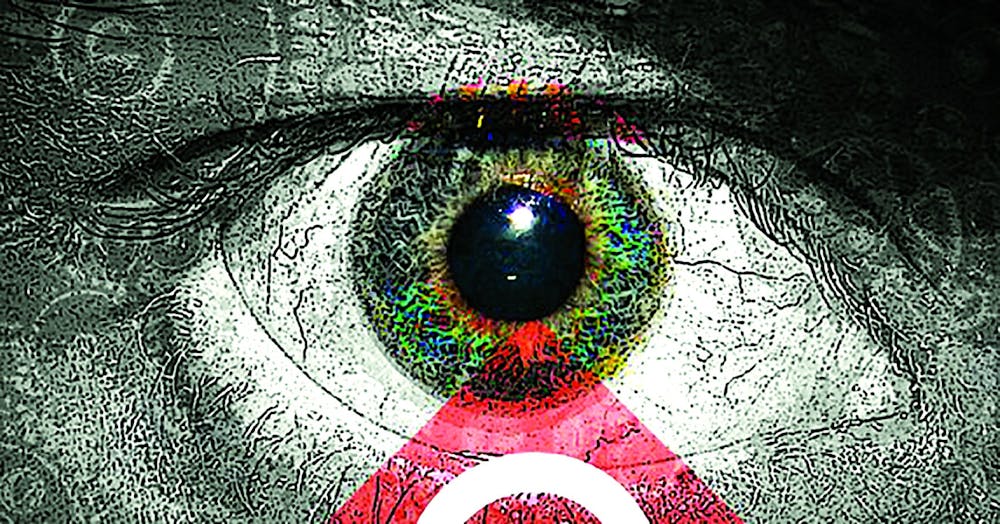POPEJOY HALL — Albuquerque was just one stop along the "1984" tour, but I'm glad they performed here. Seeing a live performance of such a fundamental novel is something that I won't forget.
The Aquila Theatre presented George Orwell’s "1984," as adapted by Michael Gene Sullivan, at Popejoy Hall on March 1 at 3 p.m.
This production had only six cast members on stage, with five others on the creative team and five more on the production team. "1984," along with "The Odyssey," are the two shows performed on the Aquila Theatre's national tour.
I admit that when I saw how small the cast was, my expectation for the show was low. The cast, however, proved me wrong almost instantly.
The show had a quick start, with a fast and hectic pace that was difficult to keep up with at first. My sunny Sunday in New Mexico had suddenly turned to a gloomy cell in the Ministry of Love, but once I was adjusted it was easier to keep up.
One of the most interesting things about this adaptation was that, instead of going through scenes chronologically, we start at the end of the book.
"The adaptation is actually quite different to the book," said Hannah Sinclair Robinson, who portrayed O'Brien and the Voice in the adaptation. "It doesn't quite follow the linearity that the book does."
Here we see four different party members reenacting Winston's past to gain his confession. All are directed by a mysterious "Voice" who seems to have the ultimate authority in the room.
"The majority of my track is offstage ... so it's interesting where I get placed in every venue," Robinson said.
One thing that stood out most to me was the paranoia of the party members. They were constantly afraid that these orders to reenact Winston's crimes were a test on themselves. The fear of doing something wrong was heavy in the air.
"There's variations within the script — it is a difficult book to adapt to the stage," Reece Richardson, the actor portraying Winston, said.
Another interesting detail was that the set never changed. The lighting and props were moved around effectively enough to distinguish different settings, but the set stayed the same. That was a simple solution for a small cast.
Get content from The Daily Lobo delivered to your inbox
My biggest complaint in this production was the faulty sound quality and microphone issues. Loud bursts of static occasionally covered up the actors' dialogue and really disrupted the Orwellian setting they were trying to achieve.
In addition, the microphone for the actor reenacting Winston's past would go on and off frequently in the first act. If I had been sitting any further from the stage, I would have missed crucial dialogue.
However, this may be due to the fact that the company's first time in Popejoy fell on the same day as the show. The pressure to set up everything correctly is immense for a one-time performance in a new location.
The actors had read "1984" numerous times to better understand the stage adaptation and consequently gained their own takes on what this show is supposed to give an audience.
"'1984' shows the value of empathy and the danger of when that starts disappearing in all aspects of life," Richardson said.
The ultimate symbol representing the dictatorship in "1984" is the authority known as Big Brother. Big Brother leads Oceania with a painstakingly tight grip on his own citizens, ensuring obedience.
Interestingly enough, Big Brother never actually appears in the novel and the same applied to the performance, making the audience question if this dictator is real at all.
It was amazing watching the party members drive Winston to insanity through the cruel acts that Orwell presents in the novel, such as the use of one's deepest fear to betray love for an individual and instead replace that with love for Big Brother.
Richardson's performance in the second act especially was phenomenal. I was clearly able to see Winston delve further and further into the insane asylum that his own mind was turning into, fed by the lies of Oceania and Big Brother.
The audience seemed very impressed by the performance, and many rewarded the actors with a standing ovation.
Six actors are all that it took to turn an empty stage with a few props on it into a different reality that transported the audience into an Orwellian society.
Megan Gleason is a freelance reporter at the Daily Lobo. She can be contacted at culture@dailylobo.com or on Twitter @fabflutist2716






